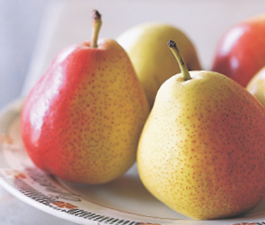selection & storage
apples
Apples continue to ripen once picked, so the fruit bowl is a great place to keep them if yours are slightly under-ripe.
Apples kept in cold storage eventually lose flavour, juiciness and crispness, their most desirable qualities. It is best to either buy apple varieties as they come into season, or purchase fruit from farmer’s or grower’s markets and roadside stalls that dot the landscape of apple-orchard territory. Buying this way may also provide an opportunity to sample some lesser-known varieties.
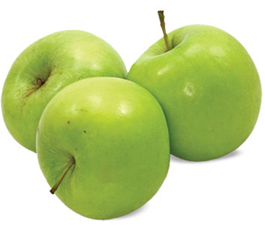
Favour firm, smooth and shiny-skinned apples that feel heavy for their size. Apples should still have their stalk intact and have dry, tight skin. Bruised apples deteriorate rapidly, so are best trimmed, then used immediately.
Apples slowly continue ripening after picking, so keep them in a ventilated plastic bag in the refrigerator crisper for 1 week. To store quantities of apples for out-of-season use, wrap firm fruit, individually, in tissue paper then spread on slatted wooden boxes (or similar). They need to be stored in a cool, dry, well-ventilated place where they will keep for several months (check them occasionally for signs of deterioration).
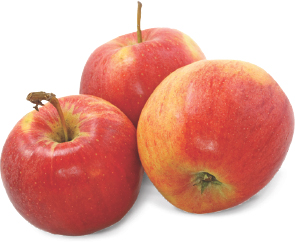
blackberries
Blackberries remain sour long after they turn black and are not truly ripe and ready to eat until they are soft. Consume them quickly, as they lose their flavour fast. Blackberries should be plump and their stems removed—attached stems are a sign that they were picked too early and may be under-ripe and tasteless.
Like all berries, blackberries can be frozen. To freeze berries so they ‘free-flow’ (as opposed to being frozen in a lump), spread them in a single layer on trays lined with baking paper, then freeze solid. Transfer to an airtight container or freezer bag, pressing all the air out of the bag, then seal and use within 6 months.
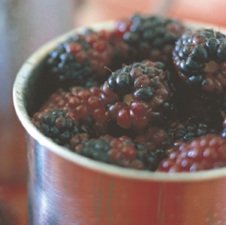
fig
There are hundreds of varieties of figs. All are highly perishable and range in colour from purple, brown, green to white, with flesh colour from crimson and pinkish brown to amber.
Choose figs that feel yielding but not squashy, and that have no splits, bruises, black spots, leaking or wrinkling on their skin. Ripe figs are sometimes coated with a natural, light whitish bloom; this is desirable.
Store figs on an uncovered tray or plate in the refrigerator for 2–3 days, but be sure to allow them to come to room temperature before eating, as chilling tends to dull their glorious flavour.
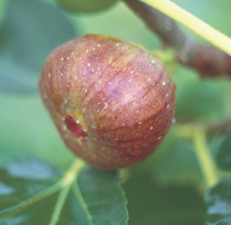
lemon
Choose lemons that have firm, unblemished, glossy yellow skin. Avoid buying lemons that are wrinkled, have cuts or soft spots or are still green—the flavour of the latter will not be fully developed. Avoid any fruits that are damp, as this causes mould to quickly grow and spread among other lemons that sit nearby.
Lemons will store for up to 2 weeks in the refrigerator or up to 1 week at cool room temperature.

passionfruit
Passionfruit grows on a vine, from which it drops when the fruit is ready. Purple passionfruit should be avoided if the skin is smooth, as they will be too tart to enjoy—when ripe their skin thins a little and becomes wrinkled.
Ripe passionfruit will keep at cool room temperature for about 1 week and up to 3 weeks if refrigerated. Both passionfruit pulp and the strained juice can be frozen.
pears
Pears are picked when mature but still hard, then transferred to cool storage to cure for a period (the length of time here depends upon variety) and then, finally, bought to room temperature to complete ripening. During ripening, the starches are converted to sugars, and the pear, unusually, ripens from the inside out.
When allowed to fully tree-ripen, pears are fit to eat for a few days only, after which their flesh turns dry and mealy. Perhaps this is why, before the days of commercial cool storage, Ralph Waldo Emerson declared that, ‘There are only ten minutes in the life of a pear when it is perfect to eat’.
To tell if a pear is ripe, it should give slightly when pressed (use your thumb) at the base of the ‘neck’. Some varieties will also smell a little fragrant. Asian pears are the exception to the above rules as they are picked when ready to eat.
